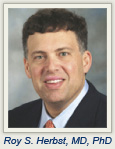 The EURTAC study provides additional evidence of the efficacy of the oral EGFR inhibitors in the first-line treatment of patients with mutated EGFR—and, importantly, in Western patients, rather than Asians, for whom data are more abundant. “The findings speak to the fact that all patients with advanced NSCLC, in my opinion, should have their tumors sequenced for EGFR mutations and, where they are mutated, be treated with an EGFR inhibitor,” said Roy S. Herbst, MD, PhD, of Yale Cancer Center in New Haven, Connecticut, in an interview with The ASCO Post.
The EURTAC study provides additional evidence of the efficacy of the oral EGFR inhibitors in the first-line treatment of patients with mutated EGFR—and, importantly, in Western patients, rather than Asians, for whom data are more abundant. “The findings speak to the fact that all patients with advanced NSCLC, in my opinion, should have their tumors sequenced for EGFR mutations and, where they are mutated, be treated with an EGFR inhibitor,” said Roy S. Herbst, MD, PhD, of Yale Cancer Center in New Haven, Connecticut, in an interview with The ASCO Post.
“The caveat is that an overall survival benefit has yet to be shown, and that is unlikely, given the high crossover rates in these trials. Patients with mutations are better served by getting erlotinib (Tarceva) (or, outside of the United States, gefitinib [Iressa]) upfront, rather than second-line, given its lesser toxicity and greater efficacy than chemotherapy in this patient group.”
Cetuximab Research
In the subset analysis of the FLEX trial, cetuximab (Erbitux) plus chemotherapy was most efficacious in patients with high EGFR expression, as determined by a new assay. “While the analysis of EGFR expression was prospectively planned, the type of analysis and the cutoff values that were chosen were established after the study’s completion. As such, while the data are interesting and hypothesis-generating, these results should be validated before we apply the findings in clinical practice,” Dr. Herbst said.
A prospective analysis of this variable in cetuximab-treated patients will be added as part of SWOG 0819, for which Dr. Herbst is the principal investigator. EGFR expression determined by fluorescence in situ hybridization remains the primary endpoint of this trial, which is now accruing in the United States.
But aside from high EGFR expression and activating mutations, there are subsets of patients who will not respond to cetuximab or erlotinib. Promising results for the irreversible tyrosine kinase inhibitor PF-299804 suggest that the next generation of EGFR inhibitors coming down the pike will work by different mechanisms, potentially target more of the HER2 pathway, and possibly have increased activity in NSCLC.
Optimizing Therapy
Conference attendees also heard that the subset of patients with ALK rearrangements may be larger than previously reported—10%—although as part of the Lung Cancer Mutation Consortium, some patient selection may be at play. “But the findings indicate that mutations can be analyzed in a multicenter fashion and can be employed in future trials and in determining therapy,” Dr. Herbst said.
European investigators also reported their work with emerging imaging techniques, which offers the promise of a noninvasive means of determining likely responders to EGFR inhibitors. “This would obviate the need for biopsy, thus sparing morbidity and cost,” Dr. Herbst observed.
Lung Cancer Screening
Finally, the publication of the landmark National Lung Screening Trial just prior to the Conference led to much discussion among lung cancer specialists at the meeting.1 The study found that low-dose helical CT reduces mortality from lung cancer by 20% among current and former heavy smokers.
“Based on this important trial, screening has the promise to become the standard of care, at least in the U.S. and especially in settings where multimodality approaches are in place to react to the test results,” Dr. Herbst said. ■
Disclosure: Dr. Herbst reported serving on the advisory committee for Amgen, Biothera, Genetics Squared, Med Trust, N of One, SynDevRx, Targeted Molecular Diagnostics, and Diatech.
Reference
1. The National Lung Screening Trial Research Team: N Engl J Med 365:395-409, 2011.

